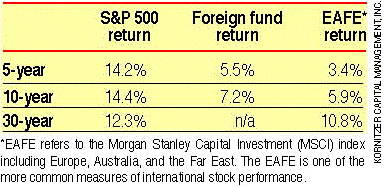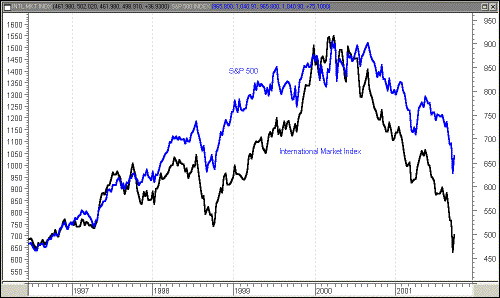
HOT TOPICS LIST
- Strategies
- Stocks
- Buy
- Investing
- Brokers
- Psychology
- Interviews
- Accumulate
- Sell
- Hold
- Spotlight
- Websites
- Candlestick Corner
- Gold & Metals
- Options Trading
LIST OF TOPICS
FOCUS ON
Buy American? What You Don't Know About Investing Overseas
10/22/01 01:03:43 PM PSTby David Penn
According to Kornitzer Capital Management's Tom Laming, some of the best international investments come from US companies. Confused? Read on.
"Over there . . . over there . . ." Investors have long been encouraged to put at least part of their hard-earned dollars to work in the equities markets of other countries. Given the more predictable returns readily available from the US stock markets, convincing investors to invest in companies they may never have patronized, operating in countries they may have never visited, can be no mean feat. In order to do so, a variety of sales pitches, claims, and counterclaims have been made about investing overseas — all with the goal of convincing investors that there are indeed major opportunities in markets outside of the U.S. For these pitches, international investing offers a great diversification hedge against downturns in the US stock market and perfect exposure to global growth. All it takes is the skill, determination, and hard work to find the right companies or, failing that, a list of international mutual funds whose managers will, for an often not-insignificant fee, provide all the skill, determination, and hard work that's required.
UNFOUNDEDThe problem, as Kornitzer Capital Management's Tom Laming pointed out in a recent white paper, is that many of these pitches, claims, and counterclaims in favor of investing internationally have an intuitive, "sounds right" appeal that often is not backed up by evidence. As Laming notes, "while that advice may have been well-intentioned, the results of the past 30 years suggest most investors would have been far better off had their dollars never left the shores of the United States." And Laming should know. The Kornitzer senior vice president is also the lead manager of the Buffalo USA Global Fund, a mutual fund company that specializes in American companies operating overseas. Requiring that the companies in the fund derive at least 40% of their revenues abroad, Laming's USA Global Fund has rewarded investors with a 16.8% return since inception (1995), and an 18.8% three-year return — although the fund is down approximately 9% year to date.
Figure 1: A comparison of returns from the S&P 500, Morningstar's foreign stock fund composite and the MSCI EAFE (Europe, Australia and the Far East) index. This is not to say that some investors who bought Japanese companies in the mid-1980s, or "Asian Tiger" companies or funds in the early 1990s, didn't enjoy some healthy returns. But the basic problem is that international stocks "have not delivered acceptable returns for the risk taken," Laming said. While these risks have perhaps become all the more obvious in the wake of the terrorist offensive against the United States on September 11, far more subtle risks, from currency fluctuations to government regulation and intervention, have always been present as threats to investment returns.
WHY INVEST OVERSEASOne of the other main reasons for encouraging US investors to invest overseas was the notion that when US markets were underperforming, international markets might actually be outperforming. Unfortunately, as Laming's research suggests, there has been an increasing correlation between domestic and international equities markets. This means the markets, more and more frequently, are rising and falling together, thus negating the effectiveness of international investments, particularly as a diversification strategy against US holdings. "World markets have grown increasingly correlated with the U.S. for several reasons," Laming observes. "Increased globalization through the easing of trade barriers has probably been a major factor. Also, as companies mature in their own country, they find international expansion as an attractive growth option." McDonald's Corp. is among the better examples of this expansion. Starting with only one restaurant in Russia in 1990, McDonald's currently has more than 60 there. Laming adds, "McDonald's now has nearly 29,000 restaurants and receives more than 63% of its sales from outside the United States." The ironic aspect of this is that while Laming is less positive on investing directly in companies based overseas, he considers himself long-term bullish on the growth prospects for many countries around the world. Because of significantly low penetration levels for a number of products, there is believed to be major untapped demand waiting to be released in many modern and modernizing countries. Says Laming: "Many countries are just beginning to put in place the infrastructure that most Americans take for granted. -- The rest of the world will have a tremendous appetite for new cars, computers, restaurants, wireless phones, and energy. "Those companies that are best able to satisfy the expected huge overseas demand will make fortunes."
Figure 2: The International Market Index ($ADR) compared to the S&P 500 over the past four years.
EXPLOITING DEMANDWhich brings us again to the crux of Laming's argument: What is the best way for investors to exploit this demand without being excessively exposed to the inherent risks? By buying the overseas company that serves this demand? Or by buying the American company operating overseas? Fortunately, as far as Laming is concerned, the choice is often not very difficult. "In many cases," Laming notes, "US-based companies operating overseas have little if any local competition." He uses the example of the microprocessor market, which is dominated by US-based companies while having a strong international component. "Intel is by far the largest producer of microprocessors," he notes, yet the company has "virtually no foreign competition for processors [while] receiving about 60% of its revenues from outside the United States." Another good example is AFLAC, a US insurance provider that, as Laming says, insures one out of every four Japanese, with fully 80% of its revenues coming from Japan. Given aging populations throughout the post-industrial world and especially in countries like Japan, AFLAC stands to gain significantly simply on the basis of demographic trends. It almost goes without saying one of the chief advantages of this approach is also that the companies invested in are often strong, rock-solid companies able to handle the administrative, financial, and strategic challenges of being dominant players in more than one market. Whether or not purchased specifically because of their overseas exposure, companies like Bristol-Myers Squibb, National Semiconductor, and Coca-Cola are the kind of blue-chip stocks that, in this environment, every stock investor should consider owning.
David Penn may be reached at DPenn@Traders.com
SUGGESTED READINGLaming, Tom [2001]. What Financial Advisors Won't Tell You About International Investing, Kornitzer Capital Management, Inc.MetaStock (Equis International)
Current and past articles from Working Money, The Investors' Magazine, can be found at Working-Money.com. |
Technical Writer for Technical Analysis of STOCKS & COMMODITIES magazine, Working-Money.com, and Traders.com Advantage.
| Title: | Traders.com Technical Writer |
| Company: | Technical Analysis, Inc. |
| Address: | 4757 California Avenue SW |
| Seattle, WA 98116 | |
| Phone # for sales: | 206 938 0570 |
| Fax: | 206 938 1307 |
| Website: | www.traders.com |
| E-mail address: | DPenn@traders.com |
Traders' Resource Links | |
| Charting the Stock Market: The Wyckoff Method -- Books | |
| Working-Money.com -- Online Trading Services | |
| Traders.com Advantage -- Online Trading Services | |
| Technical Analysis of Stocks & Commodities -- Publications and Newsletters | |
| Working Money, at Working-Money.com -- Publications and Newsletters | |
| Traders.com Advantage -- Publications and Newsletters | |
| Professional Traders Starter Kit -- Software | |
PRINT THIS ARTICLE

Request Information From Our Sponsors
- StockCharts.com, Inc.
- Candle Patterns
- Candlestick Charting Explained
- Intermarket Technical Analysis
- John Murphy on Chart Analysis
- John Murphy's Chart Pattern Recognition
- John Murphy's Market Message
- MurphyExplainsMarketAnalysis-Intermarket Analysis
- MurphyExplainsMarketAnalysis-Visual Analysis
- StockCharts.com
- Technical Analysis of the Financial Markets
- The Visual Investor
- VectorVest, Inc.
- Executive Premier Workshop
- One-Day Options Course
- OptionsPro
- Retirement Income Workshop
- Sure-Fire Trading Systems (VectorVest, Inc.)
- Trading as a Business Workshop
- VectorVest 7 EOD
- VectorVest 7 RealTime/IntraDay
- VectorVest AutoTester
- VectorVest Educational Services
- VectorVest OnLine
- VectorVest Options Analyzer
- VectorVest ProGraphics v6.0
- VectorVest ProTrader 7
- VectorVest RealTime Derby Tool
- VectorVest Simulator
- VectorVest Variator
- VectorVest Watchdog


